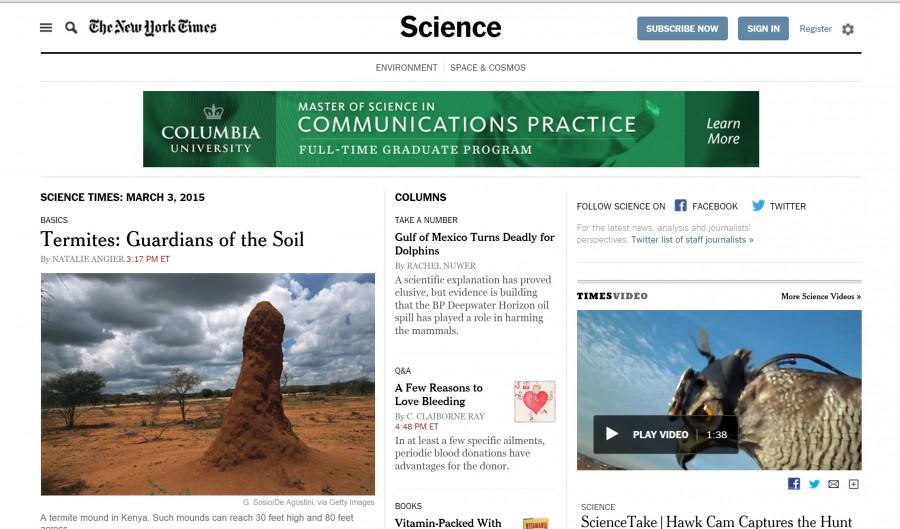Journalism can be a valuable experience, even for STEM majors
The New York Times’ science page is just one example of the overlaps between journalism and STEM topics.
February 28, 2015
It’s finally that time of year. As the Class of 2015 counts down the final month to regular decision college results, I, like many other seniors, have to endure a barrage of endless questions from well-meaning relatives and family friends.
When I’m asked the unavoidable question – what will I major in? – the expected answer is always “journalism.” It’s a reasonable assumption, because my family and friends all know of my involvement with tjTODAY. Thus, confusion inevitably follows when I tell them I actually plan to major in engineering.
You might be wondering, why on earth would a prospective engineer take journalism as an elective class, especially when Jefferson offers so many exceptional science, technology, engineering and math (STEM) courses? Giving up elective space was not an easy choice, but after four years with tjTODAY, I can, with confidence, tell you this: The lessons I learned and the skills I acquired through journalism are applicable in every profession and every situation, at every stage in life.
First and foremost, writing for tjTODAY helps me improve my communication skills through both conversation and writing. I learn something new every time I interview a student, call an advertiser, attend a press conference or contact an authority figure.
These effective communication skills are fundamental for success in every form. Entrepreneurs need to know how to pitch their latest ideas. Scientists need to know how to communicate their findings with both peers and a general audience. Parents need to know how to raise, teach and discipline their children.
Scholastic journalism has also prepared me for challenges I’m bound to face in the workplace. As Print Editor-in-Chief, I’m responsible for keeping track of around-the-clock deadlines for not only myself, but also my entire staff. Four years with tjTODAY have also taught me how to interact with and tell the stories of talented upperclassmen, school district officials and accomplished alumni – the very people who once intimidated me. When I’m reporting on a convoluted topic, I have to understand the nitty-gritty details while still keeping in mind the bigger picture.
These lessons are relevant even in a STEM career. As an engineer, I’ll face time and funding constraints for my projects. I’ll have to work with people from all walks of life and publish articulate papers on our research. I’ll need to consider if minute alterations to a machine’s concept design will alter overall performance. Thanks to my experience with scholastic journalism, I will be well-prepared to tackle the same challenges in different forms.
My experience as a student journalist has shown me that journalism and STEM don’t have to be mutually exclusive, because each has much to contribute to the other. I learned how to tackle the complexities of STEM in classes such as Organic Chemistry and Multivariable Calculus, but journalism is responsible for teaching me how to communicate this discovery and innovation, to bridge the gap between the informed and the ignorant, the passionate and the passive.
For the potential STEM major, combining journalism with traditional STEM courses can offer a unique perspective on problem solving and critical thinking. The result is a universal toolbox of skills that can be adapted for innumerable applications in life.






